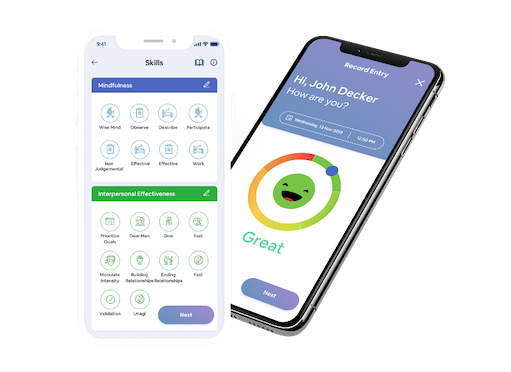Odds are, you've heard about Dialectical Behavior Therapy (DBT). In mental wellness, DBT has been increasingly getting popular over the years because of its result-oriented approach and time-saving skill-sets. Regardless of whether you originally found out about it from a companion, relative, an advisor or specialist, or even Selena Gomez, there's a motivation behind why specialists are grasping this evidence-based treatment methodology and are accepting specialty certifications to practiceDBT.
In any case, on the off chance that you've done any examination in endeavors to discover treatment for depression, you may have read that Dialectical Behavior Therapy was first evolved to treat Borderline Personality Disorder. So, does DBT really work forDepression? Well, the fact is when Dialectical Behavior Therapy (DBT) was produced for treating Borderline Personality Disorder (BPD), it was additionally discovered to be a successful treatment for depression and other mental health concerns.
A 2017 report distributed in the American Journal of Geriatric Psychiatry found that 71 percent of study members who received Dialectical Behavior Therapy as a treatment for Depression was reported to be liberated from their depressive symptoms by the end of the research.Scientists picked two of the five modalities ordinarily utilized inDialectical Behavior Therapy to treatDepression: DBT skills group and crisis coaching. Their objective was to provide the participants with new abilities to help deal with their negative feelings and life issues, particularly during a crisis. These abilities can be particularly valuable when managing the negative emotions that you experience when discouraged.
Depressive Symptoms treated by DBT
Dialectical Behavior Therapy has demonstrated to be successful for treating a significant number of the depressive symptoms, including the following:
- Trouble in focusing, thinking, or recalling
- Persistent bitterness or disturbance
- Absence of enthusiasm for once-pleasurable exercises
- Repetitive thoughts of self-harm
- Frequent, all-expending sadness
- Moodiness
- Seclusion from loved ones
- Feeling useless
- Feeling miserable about what's to come
- Peevishness
- Furious upheavals
- Loss of enthusiasm for exercises you once discovered pleasurably.
- Low resilience to disappointment/ frustration.
- Excessive guilt or self-criticism
- Migraines, chronic pain, or other physical issues that don't react to treatment.
DBT is an organized, evidence-based treatment that enables individuals to live "a daily existence worth living." A specialized DBT coach teaches certain skills to individuals that they have to achieve their objectives and decrease practices that impede accomplishing these objectives.
There are five modules of Dialectical Behavior Therapy skills, which additionally relate to five areas that depressed individuals battle with:
- Exploring up-and-down feelings (in DBT, this is called emotional regulation)
- Overseeing connections efficiently (interpersonal effectiveness)
- Enduring troublesome feelings securely and decreasing enduring reality acceptance (distress tolerance)
- Expanding one's mindfulness and centre right now (core mindfulness)
- Discovering balance between two extremes (working the middle path)
These skills are the fundamental pillars of DBT, and they are used during a patient's individual therapy, group therapy, and one-on-one skill coaching when crises emerge.
How Will Dialectical Behavior Therapy Treat Depression?

We should get into some primary depression symptoms in more depth, and perceive how explicit DBT skills for depression might be applied:
1. Continuously Sad
Something other than having an awful day, sadness is unavoidable—you can't shake it off as you feel you are trapped. Depression likewise causes grouchiness, peevishness, and episodes of outrage. You may typically lose enthusiasm for companions, family, pastimes, and exercises you once preferred. DBT skills for depression will show you how to perceive and recognize your trouble and effectively attempt to substitute bitterness with more certain feelings.
For instance, Mindfulness skills instruct individuals to be nonjudgmental of their feelings, and not beat themselves up when they end up feeling disturbed, forlorn, or negative. Consistently during your DBT treatment, you can track and rate your Depression on a scale of 1-10 or 1-100 through Daily Diary Cards.
Some adults figure out how to watch and portray their own distressing emotions, as this is what is. That these considerations are neither fortunate or unfortunate… they simply are. By thinking nonjudgmentally like this, you will begin to have the option to acknowledge your emotions as legitimate. When some adults profoundly accept reality (whatever their world looks like at some random second), the fight is now half-won. Valuable energy would now be able to be spent towards improving reality to improve things. Mindfulness additionally instructs patients to accept circumstances for what they are, or "ride the surf" of the feeling. In all honesty, simply, this device alone helps decline dismal emotions.
-
Behavioral Activation
Another key part of treating Depression through DBTis behavioral activation. This technique urges individuals to participate in exercises that are probably going to deliver positive feelings as a method of lessening the trouble related to Depression. For instance, the DBT ability of "Opposite Action" in the Emotion Regulation module works through behavioral activation. Opposite Action urges you to do the specific inverse of what is more likely to do when you are discouraged. Along these lines, for example, if you feel like lying in bed the entire day with the blinds drawn, Opposite Action advises you to get up, go out, approach others, and additionally drive yourself to participate in pleasurable activities that you used to appreciate previously—regardless of whether it's cooking, workmanship, sports, perusing, or something different—in spite of the way that you may feel they can't, or don't deserve to feel better.
2. Desires of self-damage and self-destruction
At the point when you are discouraged, it's difficult to manage the agony. A few individuals hurt themselves as a method of getting away from this torment. The issue is that problems are a part of life, and we have to discover better ways to manage it.DBT's Distress Tolerance skills will encourage you to securely and rapidly manage your problems instead of following up on their desires. Skills like "Wise Mind A.C.C.E.P.T.S," "Self-Soothe," "I.M.P.R.O.V.E. the Moment," "Pros and Cons," and "T.I.P.P." are final alternatives to endure a crisis when you would prefer not to exacerbate things. At the point when you study DBT, or during your therapy sessions, you'll know precisely what these acronyms stand for!
These skills additionally prove to be useful when others harm you amidst your invalidating environment. On the off chance that you are dismissed by a cohort or encounter a significant dissatisfaction, these distress tolerance skills will assist you to figure out how to react as opposed to internalizing the interaction appropriately, that can cause you to spiral downwards into a pit of self-doubt, withdrawal, uneasiness, and self-hurting activities.
-
Behavioral Chain Analysis
Suppose you cannot control your inclinations and by one way or another participate in a risky or therapy-interfering behavior. In that case, you should opt for Behavior Chain Analysis present in Dialectical Behavior Therapy Workbook. This worksheet asks you to reflect on each progression, including the weaknesses, emotions, and thought-patterns that you encountered only preceding the behavior, which prompted the problematic behavior (for example, the self-harm episode, binge-eating, etc.). In the wake of recording this all, you have to look back at the chain of factors contributing to dysfunctional behavior. You can now determine at which moment things could have been done differently to forestall the final result from happening.
The Chain Analysis is a significant DBT skill-set that shows discouraged individuals how to recognize all the elements, or "connections," that place them in danger for difficult conduct and "break the chain" later on early-intercession measures.
3. Feeling useless, consistently brutal on yourself
Individuals with Depression normally feel useless, inane, and like their future holds no expectation. At the point when they experience dissatisfaction or a mishap, they accuse themselves, regardless of whether they had no part to play. DBT teaches them to take a wide perspective on the circumstance, "Check the Facts," and utilize Opposite Action when their criticism/blame doesn't fit the realities.
Dialectical Behavior Therapy additionally shows you how to keep burdensome considerations from surfacing in any case. Using the "ABC PLEASE" skill in the Emotion Regulation Module, you can figure out how to expand your feelings of positivity by taking an interest in pleasurable exercises whatever number occasions in the week as could reasonably be expected and building mastery in specific tasks you are skilled at. Individuals are encouraged, consistently, to envision potential situations they will look later on that trigger their distressing emotions (for example, being overlooked at the work-place, not being asked out, or receiving appreciation from loved ones) and how they can cope in time with the circumstance to forestall their Depression (and resulting practices, for example, inclinations to self-hurt) from surfacing. This ability, as Opposite Action, likewise works through behavioral activation.
Finally, DBT firmly underscores the connection between the absence of self-care and Depression (and the opposite: appropriate self-care and positivity). "PLEASE" teaches teens to engage in daily exercise, eat healthy, balanced meals, get the proper amount of sleep per night, stay off substance abuse and see a doctor whenever necessary.

This is only a short sneak look of how DBT can help with Depression. Suppose you are struggling with Depression or significant emotional dysregulation and/or behavioral issues. In that case, Swasth's comprehensiveDialectical Behavior Therapy (DBT) Coach can help you work up your way towards better mental health free from elements of destructive behaviors and depressive thoughts.



